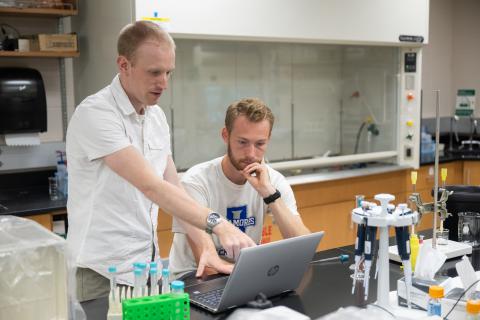Indiana State University proudly announces that Dr. Justin Miller, Assistant Professor of Biochemistry in the College of Arts and Sciences, has been awarded a $248,930 grant from the National Science Foundation. The funding will support Dr. Miller's research into the chemical capabilities of a bacterial species and provide mentorship opportunities for underrepresented students on campus.
Dr. Miller’s research focuses on Pseudomonas aeruginosa, a bacterium capable of thriving in diverse environments such as soil, plants, and animals (including humans). The bacterium communicates with other bacteria using chemical signals to coordinate activities and respond to environmental challenges.
Indiana State University Provost Dr. Christoper Olsen shared, “Dr. Miller's work spotlights Indiana State University’s commitment to providing transformative educational experiences with our world-class faculty. This grant not only supports groundbreaking research in biochemistry but also offers invaluable opportunities for students from underrepresented backgrounds to engage in hands-on scientific learning. We are proud to support research and learning opportunities to inspire the next generation of scientists.”
Recently, scientists identified a new enzyme from this bacterium, CYP168A1. Dr. Miller, alongside students from Indiana State University, will investigate the role of this enzyme in helping Pseudomonas adapt to new environments by modifying the chemical signals it uses. The research will specifically examine changes in lipids—various types of fats—modified by CYP168A1. Knowing how these lipids are changed will enable future research on how the bacterium is affected. By investigating this, the group will be able to understand how Pseudomonas aeruginosa can quickly adapt from benign states to antibiotic-resistant pathogens.
The grant also includes provisions for a mentoring program to engage students from underrepresented backgrounds in mathematical and physical sciences. This includes students from Black, Hispanic, Latino, and Indigenous communities. Alumni from these groups will serve as mentors, offering guidance and role models to current students involved in the research. Students will have the opportunity to participate in discussions, independent studies, and paid internships, fostering their interest in science and engineering, and supporting their educational and career aspirations.
Dr. Miller, a first-generation college graduate, is passionate about supporting all students as they strive to achieve their goals. He shared, “Several faculty mentors helped me greatly when I was a student navigating college life and considering what to do after graduation. I had little idea what opportunities were available to me, but these mentors played a major part in opening my career horizons.”
He added, “Besides supporting my research with and mentoring students in chemistry and biochemistry, this grant will enable me to develop campus-wide events to help students navigate college life. These events should enable our students to develop these transformational mentoring relationships with Indiana State University’s faculty, staff, and alumni.”
Dr. Melinda Roberts, Dean of Indiana State University’s College of Arts and Sciences, said, “Dr. Miller’s funding from the National Science Foundation is a great testament to the innovative spirit of our faculty. The mentorship this scientific research will bring underrepresented students helps strengthen our values of fostering a rich learning environment for all in the College of Arts and Sciences.”
